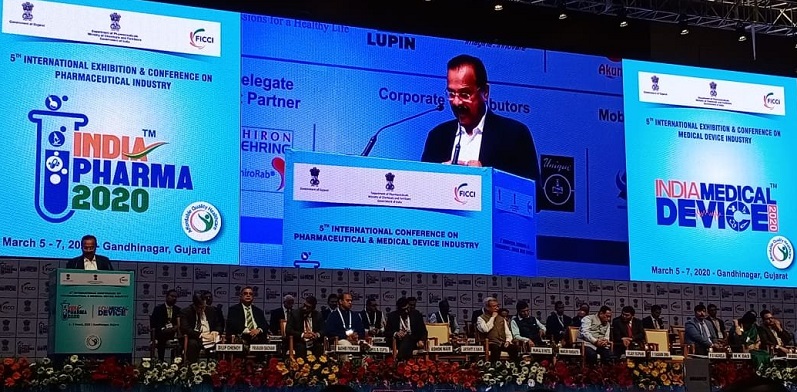Last Updated on March 5, 2020 5:14 pm by INDIAN AWAAZ

AMN / Gandhinagar (Gujarat)
The Union Minister for Chemicals and Fertilizers, Sadananda Gowda has said that there is no shortage of medicines in the country to deal with the outbreak of Coronavirus.
Inaugurating India Pharma & Medical Device 2020 conference here today Gowda assured the nation that so far, Government has been able to successfully restrict its spread in India due to strong surveillance and monitoring system. The global outbreak has not only posed immense challenge to pharma sector but also opened up a window of opportunity for the sector. He said the preparedness of Government, hospitals, medical institutions and pharma sector to deal with Corona virus in any eventuality have been strong and firmed up.
Gowda further said that there is a need to reduce our dependency on Active Pharmaceutical Ingredient (API) imports by making India self-sufficient in API manufacturing. He said that pharma companies should take a cue from this emerging situation and take steps to increase their capacity in API manufacturing.
The Union Minister said that the potential of pharma sector is very high. The growing population, increasing prosperity and rising awareness towards health provide a very good incentive to make further investment in this sector. If these opportunities are seized properly, the market size of the Indian Pharma Industry can reach to more than 100 Billion USD by 2025 while Medical Devices industry can reach to 50 Billion USD by 2025. The Government has formulated schemes for development of bulk drug park and medical device park under which Union Government provides a lumpsum amount as grant in aid to the State Governments for building common facility centers in the park. We have received several proposals from States like Gujarat, Andhra Pradesh, Telangana, Tamil Nadu, Himachal Pradesh which are under active consideration in the Department.
In developing countries, where a large section of the population may still be poor, and where out of pocket medical expenditure may be very high vis-à-vis their income, affordability of medicines is one of the prime concerns of the society as a whole. There is no doubt that pharma industry has delivered on this account by manufacturing and supplying in the country and abroad. However, a lot more is left to be achieved on this front.
The minister said that to improve affordability of quality generic medicines Government of India is implementing Pradhan Mantri Bhartiya Jan Aushadhi Pariyojana (PMBJP) with the objective to realize the vision of Prime Minister, Shri Narendra Modi to make affordable medicines available to common people, especially to poor and disadvantaged. Generic medicines sold at dedicated Jan Aushadhi stores are cheaper by at least 50% and for some even by 90%. The response of people has been tremendous. Union Minister urged pharmaceutical companies to focus on R & D and launch newer drugs in the market keeping in mind affordability considerations in developing countries.
On this occasion MoS Chemicals & Fertilizers, Mansukh Mandaviya said that the pharma and medical sector can be next “sunrise” segment. The thrust of the Government is towards ease of doing business by providing long term policy stability and simplification of regulatory mechanism that would help the pharma and medical device industry to scale new heights.
He said that Government is committed to giving affordable healthcare to each and every citizen of India. Mandaviya said that Indian Pharma sector is growing at 12% and growth of the medical device sector is at 20%. Gujarat Chief Minister Vijay Rupani also addressed the conference.
Status of availability of Coronavirus drugs in India

Earlier Department of Pharmaceuticals has constituted a committee under the chairmanship of Dr. Eshwara Reddy, Joint Drugs Controller, Central Drugs Standard Control Organization (CDSCO) to address the issues of drug security in the country in the context of Novel Coronavirus outbreak in China.
The committee, in its report, has mentioned that the present stock-inhand of the APIs may be sufficient for 2 to 3 months to manufacture formulations and also given certain recommendations. The committee further mentioned that there is no need to panic so far as drug security is concerned.
Based on the recommendations of the Committee, the department has issued necessary instructions to National Pharmaceutical Pricing Authority (NPPA), Drugs Controller General of India (DCGI) and State Governments to ensure adequate supply of APIs and formulations at affordable prices in the market and to prevent black-marketing, illegal hoarding, creating artificial shortages in the country. NPPA has also written to Chief Secretaries of States with copies to Principal Secretaries Health and State Drug Controllers requesting them to closely monitor the production and availability of APIs and formulations to prevent the black marketing and hoarding in their States and UTs as well as to ensure that there is no violation of provisions of Drugs (Prices Control) Order, 2013 with regard to compliance of ceiling prices/ permissible increase in prices of scheduled/ non-scheduled formulations respectively. In this regard, Department of Pharmaceuticals has written to DGFT to restrict exports of 13 API and formulations made using these APIs. These APIs are primarily made in Hubei province of China.
As per the latest available information, most of the Chinese companies manufacturing pharmaceutical ingredients (excluding those in Hubei province) have now resumed operations partially and expected to resume fully by end of March. There are no restrictions on the export of APIs from China. The Chinese companies are willing to export to India, however logistics sector has not yet resumed operations fully. It is observed from Port offices of CDSCO that APIs are being imported from China. As per the information received from port offices of CDSCO, 56 consignments of APIs are imported during 26th and 27th Feb 2020. Out of 56, 40 consignments are from China and rest are from countries other than China.
